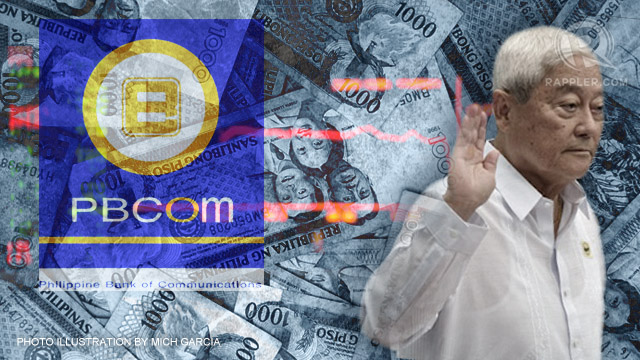SUMMARY
This is AI generated summarization, which may have errors. For context, always refer to the full article.

MANILA, Philippines – After resigning as director and co-chairman of the Philippine Bank of Communications (PBCom) early this week, businessman Roberto V. Ongpin finally exited the bank by selling his entire stake to his nephew, Eric Recto.
Ongpin, who slammed the Monetary Board of the Bangko Sentral ng Pilipinas (BSP) for its “unfair” decision to defer his election to the bank’s board, said his latest move would protect PBCom from any “untoward action” by monetary officials.
On Friday, January 4, the former Marcos trade minister sold in a special block sale in the Philippine Stock Exchange 6.13 million common and 15.36 million preferred shares of PBCom, representing 12.45% of the bank.
He sold the shares at a discounted price of P40 apiece or a total of P859.61 million to Recto, who also sits as the bank’s chairman. PBCom shares closed at P79.80 in the market on January 2.
“Since I have made public my criticism of the Monetary Board action in deferring my election to the board of PBCom, I believe that it is not sufficient that I only resign all of my positions in the bank but dispose of my shareholdings as well,” Ongpin said in a statement released on Sunday, January 6.
“I think that if I were to remain a major shareholder of PBCom, it is only natural to expect that there would be a bias by the Bangko Sentral against PBCom. Therefore, in order not to unfairly prejudice the bank, I have decided to sell all my shareholdings.”
Ongpin said he regrets having to sell out because PBCom “has a clear potential to be a very successful bank.”
“However, I realize and accept that this financial sacrifice I must undertake. Because of my decision to criticize the Bangko Sentral’s action against me, I have obligated myself to sell all my stockholdings, thus cutting off all ties with the bank, and allowing it to continue on its path to becoming one of this country’s strongest banks,” he noted.
Ongpin quit his PBCom posts on December 28 after the central bank deferred his confirmation due to supposed criminal cases filed against him.
The Office of the Ombudsman earlier recommended the filing of charges against Ongpin and former officials of state-run Development Bank of the Philippines (DBP) who were accused of forging P660-million behest loan deals in 2009.
Ongpin decried the Monetary Board’s move, arguing that no case has been actually filed against him before the courts.
Case vs Espenilla
Selling his PBCOm shareholdings was also the right move after he announced he would sue BSP Deputy Governor Nestor Espenilla, said Ongpin.
Espenilla, who headed the Anti-Money Laundering Council (AMLC) while BSP Governor Amando Tetangco was away in December, signed AMLC’s petition asking the Court of Appeals to freeze Ongpin’s bank accounts.
“When I announced that my lawyers had advised me that I had strong grounds to file a criminal case against Deputy Governor Nestor Espenilla, Jr., I am certain that this did not increase his ‘affection’ for me. Therefore, it exacerbated the need for me to disassociate myself in every way from PBCom,” said Ongpin.
The businessman claimed Espenilla caused “great damange and prejudice” to his reputation when he sought the freeze order.
It was Espenilla himself, Ongpin stressed, who told Senate hearings last year that the DBP loan transactions were “prudent and positive, and resulted in trading gains for DBP.” But he took a “contradictory position” in the AMLC petition.
Amid the controversy, Ongpin maintained he has no rancor against BSP as an institution.
“I believe that Bangko Sentral has done an outstanding job in the management of the currency and the banking system which has contributed immensely to the excellent financial health that our economy is now experiencing.”
DBP loans
In 2009, Ongpin, through Deltaventure Resources Inc., borrowed P660-million loans from DBP to buy a portion of the shares owned by the state bank in copper-gold producer Philex Mining Corp. for P12.75 per share.
Ongpin later sold the shares for P21 each to the Hong Kong-based First Pacific group, led by Manuel V. Pangilinan. DBP, led by then bank president Reynaldo David, piggy-backed on Ongpin’s deal with First Pacific and sold its remaining Philex shares.
Ongpin maintained that the loans were not only paid well before maturity and with full interest, they also generated trading gains and profits for DBP worth P1.4 billion.
However, Espenilla stated in the AMLC petition that Ongpin and others involved in the transactions caused “undue injury” to DBP as the bank lost “opportunity profits” when it sold its shares to Ongpin instead of Pangilinan. – Rappler.com
| Related stories: |
Add a comment
How does this make you feel?
There are no comments yet. Add your comment to start the conversation.